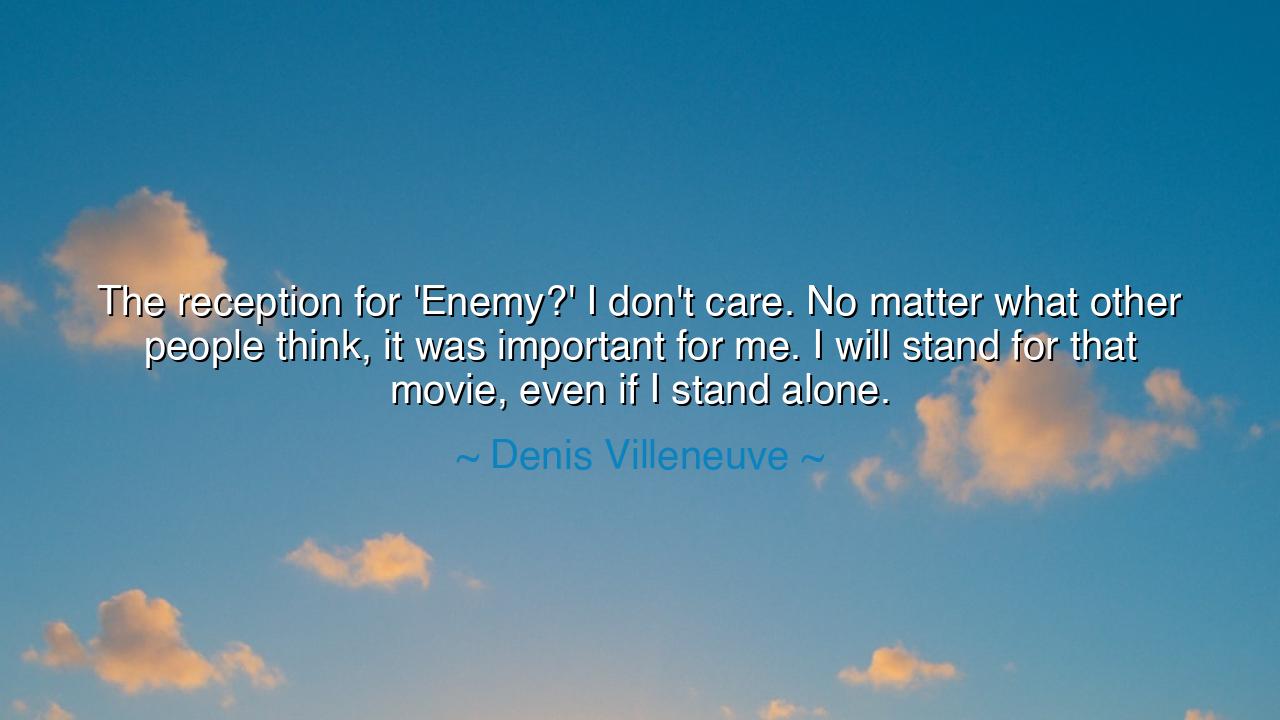
The reception for 'Enemy?' I don't care. No matter what other
The reception for 'Enemy?' I don't care. No matter what other people think, it was important for me. I will stand for that movie, even if I stand alone.






In the words of Denis Villeneuve, the artist declares, “The reception for 'Enemy?' I don't care. No matter what other people think, it was important for me. I will stand for that movie, even if I stand alone.” These words echo across time like a bell struck in the heart of solitude. They speak of conviction, of the courage to create even when the world turns its gaze elsewhere. For in every age, there comes a moment when a soul must choose between approval and truth, between the comfort of the crowd and the lonely fire of authenticity.
In uttering this, Villeneuve joins the long line of creators, thinkers, and dreamers who have known the weight of silence after their work was released into the world. To say, “I will stand for that movie, even if I stand alone,” is to embrace the sacred path of the artist-warrior — the one who fights not for victory, but for meaning. The world may praise or condemn, but the soul that acts with integrity finds a peace that no applause can equal. For what is the value of success, if it comes at the cost of one’s vision?
Consider the tale of Vincent van Gogh, who painted with the intensity of a burning sun, yet sold only a single painting in his lifetime. The world mocked his colors and called his visions mad. But van Gogh did not paint for the world; he painted for the truth within him. Now, centuries later, his name glows like a constellation in the firmament of art. His loneliness became his temple, his rejection the furnace that purified his devotion. From such lives we learn that standing alone is not failure — it is often the first step toward eternity.
Villeneuve’s words remind us that art, in its truest form, is not a mirror to please others, but a window into the soul. When he created Enemy, a film of surreal darkness and introspection, many did not understand it. But understanding is not always the measure of greatness. Sometimes, the purpose of art is to awaken a feeling, a question, a storm within the heart. The artist who dares to birth something new must face misunderstanding as surely as the dawn faces night. And yet, through that struggle, truth reveals itself.
Let us also remember the ancient philosopher Socrates, who chose death rather than betray his principles. The people of Athens accused him, condemned him, and silenced him — but his words did not perish. They grew, took root, and shaped the very soil of philosophy. Like Villeneuve, Socrates stood for what he believed, even if he stood alone. The strength of the solitary soul is not in its numbers, but in its steadfastness.
To those who live today amid the noise of opinion and judgment, this quote calls like a distant trumpet: Do not seek to please — seek to be true. Whether your art is painting, building, teaching, or simply living with integrity, the world’s reception is a passing wind. What endures is your inner fidelity to what is right and meaningful. Let no crowd drown the voice that whispers, “This is who I am.”
The lesson is thus: stand by your creations, your beliefs, your truth, even when shadows surround you. Greatness rarely blooms in comfort. Walk the path of your own making, and let your footsteps be lit by the fire of conviction. And when doubt comes — as it surely will — remember that all who ever changed the world once stood alone, holding fast to a light the world could not yet see.
So, dear listener, in your own journey, act with honor toward your truth. Do what is important for you, not merely what is admired. Speak your truth kindly but boldly. Create without fear, live without pretense, and defend your vision even if none stand beside you. For the measure of a soul is not in how loudly it is applauded, but in how bravely it stands in silence.






AAdministratorAdministrator
Welcome, honored guests. Please leave a comment, we will respond soon